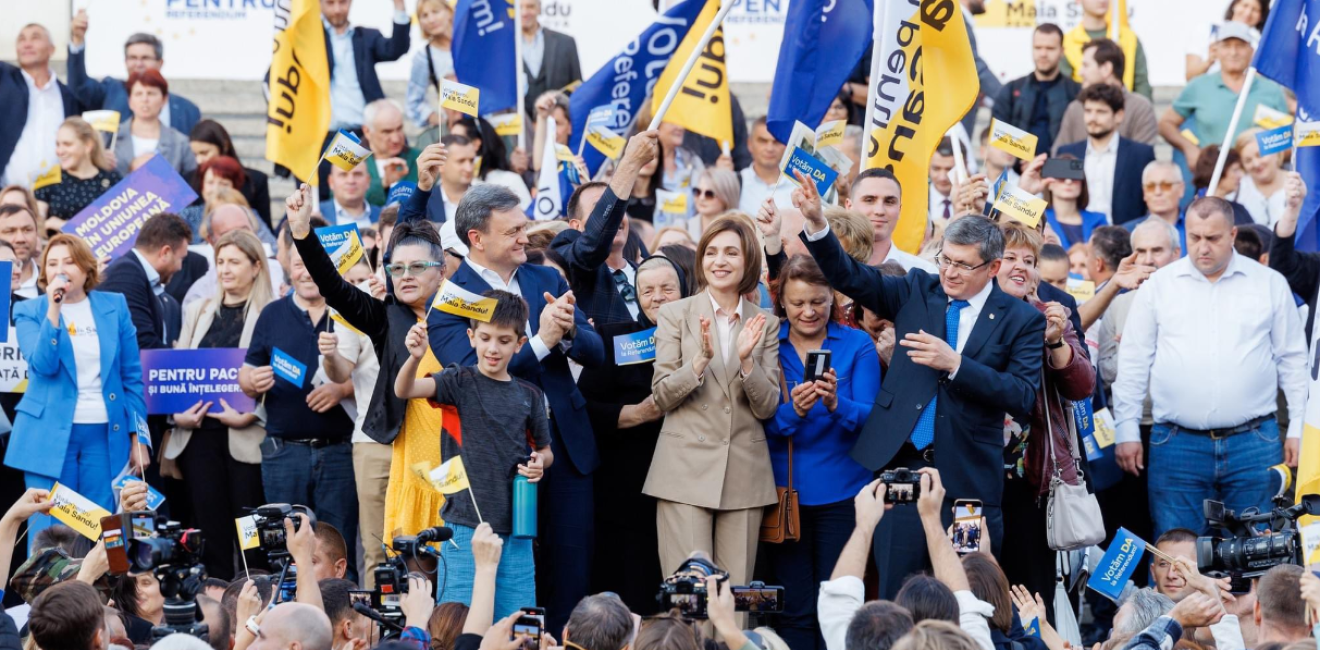On October 20, citizens of Moldova and its autonomous regions will elect both their next president and vote in a referendum on whether to pursue membership of the European Union (EU). Polls indicate that Maia Sandu, the pro-Western president is likely to win, and the pro-EU turn out will likely gain a 55-60% majority. This outcome would consolidate Moldova’s western policy in constitutional language. But that victory should not be taken for granted. Russian propaganda, vote buying, mis/disinformation are rampant. In spring 2024, 100 Russian passengers landed at Chisinau airport each carrying nearly 10,000 euros ($10,800) for buying pro-Russian votes and paying anti-EU demonstrators. $15 million flowed from Russian banks to over 130,000 Moldovan citizens to influence the vote—allegedly instrumentalized by the oligarch Ilan Shor and his opposition party Sor. Sabotage on government institutions has increased and threats of reduced Russian oil and gas flows leave citizens dreading another freezing winter.
However, Russia does not appear to seek outright annexation of Moldova, nor to recognize the independence of Transnistria, preferring to use the separatist region as a pressure point over the Moldovan government in Chisinau. Vladimir Putin recognizes that Russia cannot currently reach Moldova for resupply and personnel rotation, and a repeat of Crimean annexation would antagonize other regions bordering Russia. Instead, he prefers to take a formally neutral but practically dependent role. Conventional war is unlikely, but hybrid war is active. Moscow is playing the long game to prevent Moldova joining the EU and gain a pliant, if not allied state on Ukraine’s southwestern border. If not a win for the Socialist Party this October, the Kremlin seeks to persuade citizens to vote for opposition parties in the July 2025 parliamentary elections. The legislature is where real power lies in Moldova. The powers of the Moldovan president are modest, and Sandu counts on her majority in parliament to shape policy and govern. Were Sandu’s party, Party of Action and Solidarity (PAS) fail to win a majority in 2025, she would be forced to align with center-left factions that do not have a strong pro-European record.
To accomplish this, Russian supported social media is bad-mouthing President Sandu and seeding doubt that Brussels will actually offer EU membership to Moldova. Russian security services sponsor antigovernment demonstrations, cut gas supplies and interfere in Moldova’s domestic politics. They seek to divide Moldovan society along linguistic lines, aggravate old ethnic grievances, infiltrate the press, buy off local or parliamentary officials and degrade trust in Chisinau. Moldovan NGO’s have been tracking propaganda emanating from Moscow revealing disinformation that has increased over the past two years. The stream of exaggerations and outright lies that play on long-held fears can be effective. In a recent poll, the NGO Watchdog.md showed respondents evenly divided on whether Russia constitutes a threat to Moldova’s security.
Sandu’s government is pushing back. Authorities have charged opposition parties with illegal campaign financing and suspended the licenses of six TV stations linked to Ilan Shor on grounds of “incorrect information’ about Moldova and the war in Ukraine. In 2023 Sandu ordered local internet providers to block more than 20 Russian websites. These measures, in turn, have provoked the opposition and civil society to complain of ruling by decree without political or judicial review.
A pro-Western Moldova has particular interest for the EU, but also for transatlantic relations. Incremental Russian presence on Ukraine’s southern region is aimed to go beyond Odessa to Transnistria and then to Moldova where Moscow would likely secure a treaty-based troop presence and put Russian soldiers on Romania’s border. Washington has devoted increased attention and assistance to Moldova, supporting its energy security, infrastructure, independent media, military equipment, and training. These efforts need to continue no matter the outcome of the votes in October 2024 and July 2025.
Author


Global Europe Program
The Global Europe Program is focused on Europe’s capabilities, and how it engages on critical global issues. We investigate European approaches to critical global issues. We examine Europe’s relations with Russia and Eurasia, China and the Indo-Pacific, the Middle East and Africa. Our initiatives include “Ukraine in Europe”—an examination of what it will take to make Ukraine’s European future a reality. But we also examine the role of NATO, the European Union and the OSCE, Europe’s energy security, transatlantic trade disputes, and challenges to democracy. The Global Europe Program’s staff, scholars-in-residence, and Global Fellows participate in seminars, policy study groups, and international conferences to provide analytical recommendations to policy makers and the media. Read more

Explore More
Browse Insights & Analysis
Greenland’s New Governing Coalition Signals Consensus

Myanmar’s Junta and the 2026 Elections: A Fig Leaf for Legitimacy?




